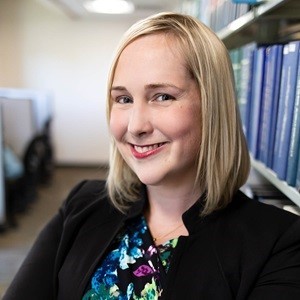July 28, 2023
July 2023: Katherine Macfarlane

Katherine Macfarlane (she/her)
Associate Professor of Law and Director of the Disability Law and Policy Program, Syracuse University College of Law
From an early age, I knew I wanted to be a lawyer. I was inspired by the civil rights movement of the 1950s and 1960s, and the young people who took part in sit-ins and boycotts. I looked up to civil rights lawyers like Justice Thurgood Marshall.
As I was dreaming of a legal career, I was also dealing with complex health issues. I was diagnosed with rheumatoid arthritis (“RA”), an autoimmune disease that causes joint damage and chronic pain, when I was 13 months old. I was also diagnosed with uveitis, an inflammatory eye disease that can lead to permanent vision loss. Some of my earliest memories are of medical appointments, where I was poked and prodded, and told by one doctor after another that I was too young to be this sick. They also told me I’d grow out of RA. After all this time, I have never experienced even a brief remission.
It would take me a long time to connect my passion for civil rights to my experience with disability.
For most of my life, I was ashamed of my illness and of my difference, which made me feel deeply isolated from my peers. Some of my teachers knew about my RA, but not many classmates were clued in. In college, I would cancel plans when a flare hit, telling people that I just needed time to study.
In law school, I finally requested formal accommodations. I fretted over whether I was asking for too much, worried that my academic success would be questioned. But all I received was a 5-minute stretching break, off the clock and away from my computer, during each hour of an exam. I should have asked for breaks taken in front of my computer—just because my hands needed to rest didn’t mean that my train of thought should have been interrupted. Now, I counsel students with disabilities to ask for as much as they deserve.
As a student, law clerk, and lawyer, I overperformed and overachieved. My goal was to accumulate enough good will to balance out any resentment that would otherwise surface when I had the inevitable medical crisis.
In search of a healthier lifestyle, I entered academia. During my fellowship at LSU, I taught a disability law seminar. My students’ passion for the subject, and the fact that disability law was profoundly influenced by the civil rights movement and people with disabilities themselves, would eventually steer my career in new directions. I went from being a rigid civil procedure scholar to a disability law advocate.
I also began to publicly identify as a person with disabilities. I don’t know if I made the right choice, as it has opened me up to disability discrimination. But I’m grateful for the community it’s brought me, and my ability to mentor colleagues and students with disabilities.
In 2021, I published Disability Without Documentation. I described how employees with disabilities who request reasonable accommodations struggle to meet employers’ burdensome and unjustified medical documentation demands. I also worked with Professor Katie Eyer and others to form an affinity group for law professors with disabilities and their allies, the first of its kind. During the 2022-2023 academic year, I worked in the Department of Education’s Office for Civil Rights in connection with the Department’s commitment to update the regulations implementing the Rehabilitation Act of 1973, a landmark civil rights law. I was assigned to a team focused on higher education. My experience with accommodations, and what I’ve learned from my students with disabilities, informed my work.
As I enter my ninth year of law school teaching, RA still impacts most aspects of my life. But I’m excited to be back on campus this Fall and look forward to meeting ACS members. I’ve always loved watching my students grow into leaders who energize the student body and remind us of our responsibility to keep civil rights protections alive. With each passing year, I see a growing recognition of the inequality experienced by people with disabilities, thanks in no small part to student activism.



